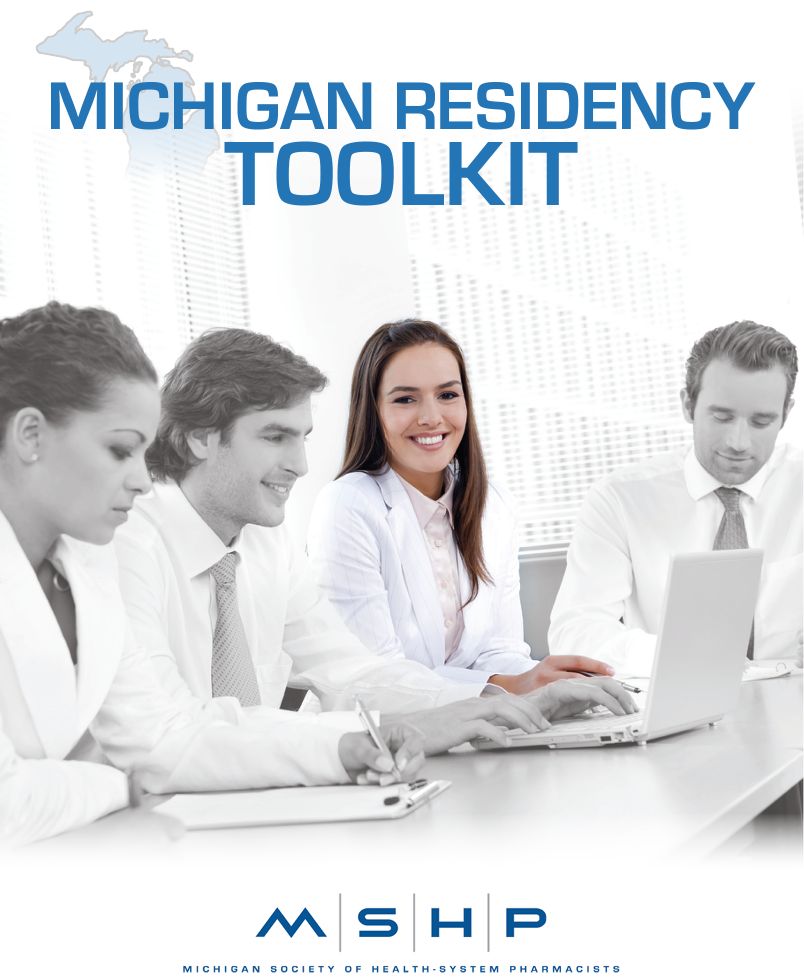Michigan Residency Programs
Residency Programs Are Available To Train Pharmacists In Professional Practice And Management Activities.

There are many benefits to participating in a residency program, including enhancing patient care and management skills, learning how to teach and precept students, participating in a project, developing leadership skills and gaining a better understanding of global issues that affect the profession.
Another important benefit is the significant advantage to be gained by working with some of the most innovative pharmacy practitioners and leaders in the country.
These practitioners can often expose the resident to state-of the-art practices they never thought were possible. Residents gain confidence, enhanced problem-solving abilities, and improved communication skills, and their residency serves as an important stepping stone in developing their professional career.
Explore all of the residency programs available in Michigan! This interactive document includes a full listing of all Post-Graduate Year 1 (PGY1) and Post-Graduate Year 2 (PGY2) residency programs offered in the state. It also provides director and program contacts, direct links to the American Society of Health-System Pharmacists residency listings online and links to any available program listings online that are offered by the practice site.
Click here to access the document.
In order to promote the quality of Michigan Pharmacy Residency Programs, the following data was collected from a sample of voluntarily participating Health-System PGY1 Pharmacy Residency Programs throughout Michigan in May 2019. The information below represents data from 17 of the 24 (71%) PGY1 programs in Michigan.
Michigan PGY1 Pharmacy Residency Site Data
- There are 24 Health-System PGY1 Pharmacy Residency Programs in Michigan.
- There are 96 Health-System PGY1 Pharmacy Resident positions in Michigan.
- There are 29 PGY2 Pharmacy Residency Programs in Michigan.
- There are 35 PGY2 Pharmacy Resident Positions in Michigan.
- 69% of Michigan PGY1 Pharmacy Residency Program preceptors are residency trained.
- 54% of Michigan PGY1 Pharmacy Residency Program preceptors are board certified.
- Median of 55 APPE rotations per site per year
Michigan PGY1 Pharmacy Residency Pharmacy Services Data
- 82% of programs have Code Blue Response
- 100% of programs document notes in the inpatient electronic medical record (EMR)
- 94% of programs document notes in the ambulatory care EMR
- ER Pharmacist Hours
- 47% of programs have an ER pharmacist 24 hours per day
- 12% of programs have an ER pharmacist 13-23 hours per day
- 24% of programs have an ER pharmacist 1-12 hours per day
- 18% of programs have an ER pharmacist 0 hours per day
- Dosing Services provided by pharmacy department
- Antimicrobial Dosing
- 71% provide all antimicrobial dosing
- 29% provide some antimicrobial dosing
- Anticoagulation Dosing
- 59% provide all anticoagulation dosing
- 41% provide some anticoagulation dosing
- TPN Dosing
- 18% provide all TPN dosing
- 41% provide some TPN dosing
- 41% provide no TPN dosing
- Antimicrobial Dosing
- Medication Histories completed by pharmacy department
- 12% complete all medication histories
- 76% complete some medication histories
- 12% provide no medication histories
- Discharge Counseling provided by pharmacy department
- 6% provide all discharge counseling
- 82% provide some discharge counseling
- 12% provide no discharge counseling
Michigan PGY1 Pharmacy Residency Outcome Data
- 50% of PGY1 Pharmacy Residency Program graduates were board certified within 2-5 years of PGY1 program completion.
- 33% of PGY1 Pharmacy Residency Program graduates went on to complete additional post graduate training via PGY2 or fellowship.
- After completion of post-graduate training:
- 79% of those who completed a PGY1 Pharmacy Residency in Michigan obtained an inpatient health system job
- 14% obtained an ambulatory care job
- 2% obtained a job in academia
- Of PGY1 Pharmacy Residency Program graduates from 2011-2016, 72 longitudinal projects were published and 340 abstracts, posters and platform presentations were completed.
- 60% of programs had 100% of residents present an abstract, poster, platform presentation at an ASHP meeting
Michigan Health-System PGY1 Pharmacy Residency Programs that Voluntarily Submitted Site and Outcome Data:
- Ascension Borgess
- Ascension St. John
- Ascension Genesys Hospital
- Beaumont Hospital Dearborn
- Beaumont Hospital Royal Oak
- Bronson Battle Creek Hospital
- Bronson Methodist Hospital
- Detroit Medical Center
- Henry Ford Hospital
- Henry Ford Macomb
- McLaren Oakland
- Mercy Health Saint Mary’s
- Michigan Medicine
- Munson Medical Center
- Saginaw VAMC
- Sparrow Hospital
- Spectrum Health
Click here to access the Michigan Residency Toolkit.
If you are interested in either starting a residency program or expanding your current residency program, please contact Alisha Swanchara, MPA staff liaison for the Residency Committee.

The American Society of Health-System Pharmacists (ASHP) Pharmacy Practice Model Initiative (PPMI) delineates the importance and necessity of residency completion for clinical care. As the market becomes more competitive, new practitioners are seeking residency positions to help transition from student to clinical pharmacist. Despite the fact that more residency programs have become available over the past several years, the number of student pharmacists and graduates applying has dramatically increased.
The MSHP Residency Committee remains focused on helping to create new residency programs as well as expand existing programs. In order to facilitate this process, a toolkit is now available to assist institutions in developing and expanding pharmacy residency programs. The toolkit addresses several areas identified as potential rate limiting steps in defining, acquiring, and justifying a new or expanded residency program. The MSHP Residency Toolkit consists of six helpful sections, which are briefly described below:
- MSHP Resident Justification Worksheet – for those interested in starting a residency program, this worksheet will show you how to estimate Centers for Medicare and Medicaid Services pass-through funding as well as the total savings to your institution.
- MSHP Resident Justification Blank Worksheet – provides a “blank” version of the above worksheet; available as a fillable PDF or separate from the toolkit as a customizable Word document.
- Checklist for Developing Your Residency Program – provides a detailed list of the key steps to consider in planning your residency program.
- Incorporating Pharmacy Residents into Your Practice Model Article – provides various examples of how residents can be successfully incorporated into your practice model. This document also includes a list of residency program directors who are willing to answer questions about implementing or expanding a residency program.
- Recruiting New Residents to Your Residency Program Article – provides a list of recruitment events in Michigan and neighboring states. This document also discusses the role of technology and past students/residents in the recruitment process.
- MSHP Resident Expansion Justification Worksheet – for those interested in expanding your residency program, this worksheet will show you how to estimate the workload impact and cost of such an expansion.
Residents have the opportunity to get involved with the Michigan Pharmacists Association (MPA) and its practice sections (Consultant Pharmacists Society of Michigan, Michigan Society of Community Pharmacists and Michigan Society of Health-System Pharmacists).
Why Be a Part of MPA?
- Provides a great way to network with other health-system pharmacists in Michigan
- Gives you a chance to learn about issues facing pharmacy and how to solve them
- Allows you to share your ideas from school experiences or experiences from other states
- Gives you an avenue to impact the profession
- Residents have the opportunity to be published by writing articles for various Association publications
- Residents have the opportunity to serve as presenters at Association events
How Do I Become a Member?
- Join online, or call the MPA office at (517) 484-1466. Be sure to choose a practice section or affiliated chapter with your membership! Residents can join the Association at a reduced rate.
How Can I Get Involved?
- MPA and MSHP have a variety of Committees, all of which provide great opportunities for residents!
- After you’ve become a member, if you’re interested in an MPA Committee or MSHP Committee, complete the respective interest form online by following one of the links below
- Ask your program director for suggestions of other ways that you can get involved
What Does it Take to Be Involved in a Committee?
- The Membership and Public Affairs Committees are combined with the MSHP Committees and they meet during MSHP Committee Day in January and May. Committee Day is typically held at Lansing Community College West Campus.
- Other MPA Committees schedule their own meetings (generally 3-4 per year at the MPA Headquarters in Lansing.)
- As mentioned above, MSHP Committees meet twice each year during MSHP Committee Day, and schedule additional meetings as needed
- Creative ideas to share with others in the group!
Click on the links below to view video presentations from the 2014 MSHP Residency Conference, an annual event designed to enhance the residency experience for residency directors, preceptors and residents.
- Keynote Session: Tips for Personal Growth and Professional Development
Lynette R. Moser, Pharm.D., clinical associate professor, Wayne State University Eugene Applebaum College of Pharmacy and Health Sciences, Detroit, Mich.
- First Steps in Your Career and Reinventing Along the Way
James S. Kalus, Pharm.D., BCPS (AQ CV), senior manager, patient care services, PGY1 residency program director, department of pharmacy services, Henry Ford Hospital, Detroit, Mich.
- Publishing for New Practitioners: A Guide to Achieving Early Success
Christopher A. Giuliano, clinical assistant professor, Department of Pharmacy Practice, Wayne State University Eugene Applebaum College of Pharmacy and Health Sciences, Detroit, Mich.
- Advocating for Pharmacy – How and Why
Amanda A. Lick, M.A., manager of advocacy, governmental and regulatory affairs, Michigan Pharmacists Association, Lansing, Mich.
- ABCs of Credentialing
Susan DeVuyst-Miller, Pharm.D., clinical assistant professor, pharmacy practice, Ferris State University College of Pharmacy and clinical pharmacist, Meijer Inc., Grand Rapids, Mich.
